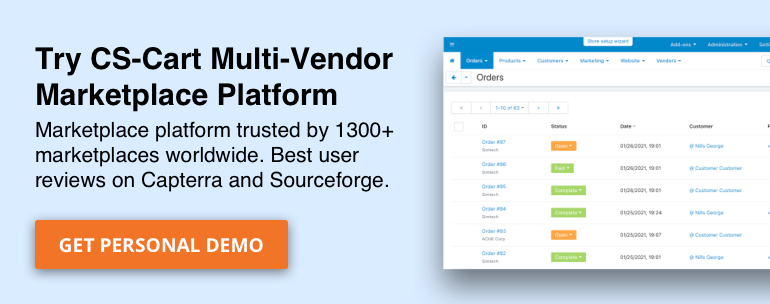Ecommerce Security: Why Quick Problem Reaction Can Prevent the Destruction of an Online Marketplace Businesses
Whether you already have an online marketplace up and running or are looking for ways to start your e-commerce business on the right foot, ecommerce security and quick problem reaction are a must. According to CPO Magazine, almost 60% of cyber attacks in 2019 were targeted at small and online businesses via DDoS, phishing and social engineering threats, while most businesses invest less than $500 a year in terms of electronic commerce security. Tech Beacon published research stating that 94% of malware attacks in the past year have been delivered via email, while 20.4% of total web traffic carries malicious bots looking for the next site to exploit.
While paid software solutions are not the only way to protect your online marketplace from scams and security breaches, you should be on your guard for any malware intrusions, social engineering exploits and other malicious threats 24/7. With that in mind, let’s explore why quick problem reaction can indeed prevent the destruction and loss of credibility for your online marketplace as well as several ways in which you can circumvent just that and remain operational.

The Advantages of Quick Problem Reaction in E-Commerce
The online marketplace industry is booming in recent years, making peak performance and data security a top priority. For better or worse, no online business is singular in its industry, whether you sell in-house designed products and services or act as a global reseller.
As such, it’s pivotal that you offer a reliable sense of security for your sellers and customers alike to keep them engaged with the online marketplace for an indefinite future. Coupled with competitive content writing with the aid of tools such as Top Writers Review and Evernote, you will be able to maintain an aura of trust and professionalism with your online marketplace’s userbase.
Once a problem does rear its head, you need to make sure that you are ready to solve it quickly and without downtime. This will help you build trust and reliability with your stakeholders, inviting others to use your online marketplace due to its pro-active, solution-driven design. As such, several concrete advantages can be attributed to quick problem reaction and online safety in an e-commerce environment, including the following:
- Improved SEO ranking due to pro-active site management
- Lowered risk of e security in e commerce intrusions
- Better safety of seller and customer information
- Growth of brand reputation and industry authority
- Higher marketplace profitability and revenue generation
Guidelines to Prevent E-Commerce Problems and Bottlenecks
Choose your Tools Wisely
When it comes to solving problems that may appear in your online marketplace, the best way to do so is to prevent them outright. That’s why web security in e commerce is very important. As such, one of the first things you should do is to only rely on trusted, publicly-available software, tools and plugins. For example, the CS-Cart Multi-Vendor is a great solution for marketplaces that aim to enable independent vendors to sell their products through a single storefront. As such, its inclusion in your business model should be a no-brainer.
The same logic applies to your choice of marketplace theme and additional quality of life plugins. Only download and use software tools from trusted developer sources to avoid glitches or malware intrusion risks down the line. This will help you maintain the performance of your online marketplace around the clock and allow both sellers and customers to safely use the features you provided them with to their hearts’ content.
Collect Only Essential Information
Database breaches and information leaks are a common problem in online marketplaces of all scales and industries. That being said, you can minimize potential problems caused by database intrusions by only collecting essential information from your sellers and customers. Think PayPal rather than a traditional bank.
Information such as their home addresses, phone numbers, and national ID data is not necessary for successful transactions to take place. This information is excess in terms of e-commerce and can only cause your platform a variety of problems down the road. From typical malware breaches to GDPR violations, too much stakeholder information stored on your end is an unnecessary risk and a problem waiting to happen.
Active Malware Protection is a Must
While you may be able to minimize social engineering scams and intrusion attempts by carefully vetting incoming emails and contact attempts, malware is a different story. As we’ve mentioned previously, most malware is autonomous and travels the web in search of the next website with a vulnerability. You won’t know that malware has targeted your online marketplace until it’s too late and the damage has already been done.
This can be avoided entirely by integrating antivirus solutions designed for Android, iOS, Windows, iPhones, and more, such as Norton and Avast, to name a few. These platforms can be custom-set to look for incoming cyber attacks and to update their databases regularly. Once the protection is in place, both you and your stakeholders will have a safer, more reliable e-commerce platform to work with.
Inform Stakeholders of Essential Safety Steps
Another great way to circumvent any problems or downtime on your online marketplace is to preemptively inform your sellers and customers of essential safety measures. You can use a popup window, your chatbot or a separate page accessible from the landing page to do so. Alternatively, you can make this info a part of your terms of service and make their acknowledgment mandatory for new stakeholders.
Explain your concerns in regards to e security in e commerce, potential issues with your platform, upcoming maintenance schedule, and other safety-related information. While not every seller or customer will go through the information thoroughly, they will at least be aware of it and be more careful in using your online marketplace as a result.
Daily Marketplace Monitoring
Lastly, the best way to implement a quick problem reaction on your e-commerce website is to monitor
the marketplace on a daily basis. Make it a habit to check your site for new sellers, transactions, comments, traffic, and other data regularly.
This will give you a good idea of what healthy site performance looks like and you will detect fluctuations or strange changes more quickly as a result. Likewise, constant marketplace monitoring will give you the opportunity to collect user data in regards to future improvements, site expansion or bug fixes among others. Data monitoring system is very important part of network security in e commerce.

An Ongoing Effort (Conclusion)
Quick problem reaction to potential bottlenecks that may spring up on your online marketplace is extremely important for the longevity of your platform. Online credibility and user trust are hard to gain and very easy to lose in the light of cybersecurity breaches, site crashes or sales scams under your watch.
Develop a data monitoring system on your platform in terms of who sells, who buys and who generally visits your website and from where. Whether it’s potential social engineering flaws or malware vulnerabilities, fixing these problems preemptively will paint a very professional and reliable image of your business in the eyes of existing and future stakeholders alike.
About the author:
Angela Baker is a self-driven specialist who is currently working as a freelance writer at writing services such as Is Accurate where she tries to improve herself and her blogging career. She seeks to discover new ways of personal and professional growth and is convinced that it’s important to broaden one’s horizons, which is why she strives to develop her skills throughout the writing process to help to inspire people. Angela is also a writer for Live Inspired Magazine, rounding out her professional writing career.
More useful eCommerce articles and infographics are coming your way. Follow CS-Cart on Facebook and Twitter not to miss them!

Yan Anderson is the Head of Content Marketing at CS-Cart with over 10 years of experience in the eCommerce industry. He's passionate about explaining complicated things in simple terms. Yan has expertise in building, running and growing eCommerce marketplaces. He loves to educate people about best practices, new technologies, and trends in the global eCommerce industry.

